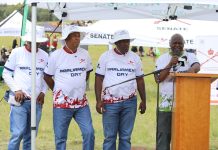Africa-Press – Lesotho. Against the backdrop of so many bad things happening across the world and in our own country on the social, economic and political fronts, it is almost unthinkable to expect that the new year will bring with it any magic solution to these myriad problems that human beings create for themselves.
Especially those where solutions exist but lack of political will delays resolution. A glaring problem of direct concern to us, and very acutely felt at this moment, is the failure of the authorities down the years to fulfil their repeated electoral promise of ensuring 24/7 water at the tap to ALL citizens.
Billions have gone into consultancies and reports, yet the objective is far from being achieved, let alone anyone in authority being willing to wager a bet as to when this will happen – if it ever does. Meanwhile, we are facing an impending drought. Similarly, on several other issues, high expectations are not justified.
The Ukraine war is likely to continue, supply chains will not be restored to normalcy any time soon, all countries will face economic hardships even as several go into recession (with the greatest sufferers being the people).
Moreover, terrorist attacks will keep taking place, to existing conflicts will be added the threat of new ones – like the second one in Europe between Kosovo and Serbia, or the China-Taiwan confrontation that is becoming a matter of increasing concern — and contrasting catastrophes will hit individual countries as well as affect countries all over the world.
For example, the recent ‘stormbomb’ of heavy snowfall, strong winds and temperature down to as little as minus 50 degrees Celsius in the US that has claimed nearly 50 lives was the opposite of the ongoing dryness that has affected the south west of the country: its largest freshwater reservoir, Lake Mead, has seen its level fall drastically to a dangerously low mark.
The World Cup in Qatar ended with the victory of Argentina, and throughout the duration of the games wild enthusiasm prevailed, and praise and accolades were showered on the heroes.
But was there any news coverage about the darker side of the event – other than the rioting by Moroccans et al in France? No, because these things had better remain under the radar so as not to cause offence to the moneyed organizers.
Who, except close family and friends would want to know that there were hundreds of deaths among the thousands of workers who were hired to work on the construction of the stadium? Whose passports were confiscated when they landed there, who were made to toil in temperatures touching the 50s degree Celsius, for long hours? Who would console that father from Kerala who had to receive his son’s corpse instead of welcoming him home after the games were over?
The litany of such destructive phenomena and inhuman treatments is very long, but these few examples indicate the trend. Focusing on them can cause much despair and trigger dark thoughts in one’s mind about our future, but fortunately one can balance them by more positive news coming in the main from the world of science and technology, and medicine and its allied fields.
Thus, during this year was launched the James Webb Space Telescope (JWST) which has superseded the Hubble telescope, and has sent fabulous photographs of our early universe that surpass in detail and in optics the already spectacular ones that came from Hubble during its lifetime.
Besides, these images are so refined that they have allowed astronomers to make calculations that have yielded findings that are advancing much further the frontiers of knowledge about the evolution of the universe from its earliest origins.
The JWST itself was many years in the making until the final stages were reached, and its successful launch to its precise positioning way above the Earth nothing short of another big WOW moment for not only the team that did the job but for science and the world at large.
Such accomplishments should make us proud as human beings, as should the ones with the potential for more practical applicability. In this category one can place the discoveries and techniques such as CRISPR in genetic engineering that now allow scientists to correct defects caused by faulty single genes.
There is a category of rare diseases caused by alterations in the genetic make-up of what are known as the powerhouses of the cell, the mitochondria, resulting in mitochondrial disease syndromes.
A few days ago, there was a report about six children suffering from mitochondrial disease showing remarkable improvement after they were treated by correction of the genetic fault in their mitochondrion, a first in the field that holds much promise to come.
For More News And Analysis About Lesotho Follow Africa-Press






